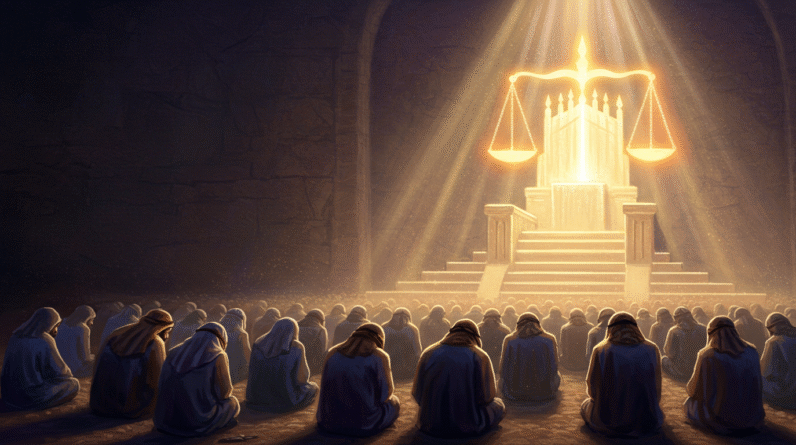while being original.
God’s Justice Is Perfect (Deuteronomy 32:4)
You read Moses’ words and feel the weight of eternity: “He is the Rock, his works are perfect, and all his ways are just. A faithful God who does no wrong, upright and just is he.” Deuteronomy 32:4. That simple sentence captures the heart of who God is — a refuge and a righteous judge. When you study this verse, you’re not only reading ancient poetry; you’re meeting the God who combines unshakable strength with flawless justice and unwavering faithfulness. As you reflect, you’ll discover how divine justice is not cold or distant, but a perfect attribute that works hand in hand with divine love.
Understanding Deuteronomy 32:4
When Moses calls God “the Rock,” he’s using imagery you can grasp instantly: immovable, reliable, a place of shelter. “His works are perfect,” reassures you that God’s actions are without defect. Most striking is “all his ways are just.” That tells you that every plan, every outcome, every judgment that comes from God is rooted in perfect justice and righteousness. This doesn’t mean everything you experience will feel fair, but it does mean that in the larger, eternal view, God’s judgments are right and for your ultimate good.
The historical and literary context of Moses’ song
Deuteronomy 32 is Moses’ song to Israel — a prophetic, poetic summation of God’s relationship with His people and a stark warning of what will happen if they turn away. In that context, the reminder of God’s justice is meant to anchor a people tempted to forget God’s ways. When you read the passage today, imagine a leader reminding you of the character of the One who formed the world and shaped Israel’s destiny. God’s justice in this song positions Him both as protector and sovereign judge, whose faithfulness endures even when people fail.
The meaning of “justice” (mishpat) in the Hebrew
The Hebrew word often translated “justice” (mishpat) carries rich meaning: legal rightness, vindication, moral order. When Scripture says God’s ways are just, it means He establishes what is right and settles what is wrong with wisdom and righteousness. For you, this is not an abstraction — it becomes trust. Even when your circumstances seem chaotic, you can rest in the truth that the One who rules the universe orders things according to unbreakable moral truth.
“God is faithful” — covenant and trust
Moses’ declaration that God is “faithful” echoes the covenantal heart of Scripture. God makes promises and keeps them. He does not change his mind or contradict his nature. When you face doubt or betrayal, you can rely on God’s faithfulness. That faithfulness is demonstrated over and over in Scripture and is the foundation for your hope and the reason you can call him “Rock.”
How Justice and Love Coexist in God
It’s tempting to think justice and love must be at odds: either strict law without mercy, or mercy that ignores justice. But Scripture reveals that God’s justice and God’s love converge wonderfully at the cross and throughout redemptive history. John tells you plainly that “God so loved the world that he gave his one and only Son…” John 3:16. But that giving is not a cheap sentiment; it is a just action to address sin’s penalty. Romans explains that God presented Christ “as a sacrifice of atonement, through the shedding of his blood—to be received by faith.” The cross is where God’s holiness and love meet, where justice is satisfied and mercy is extended, Romans 3:25-26.
Examples from the Old Testament
Throughout the Old Testament, God demonstrates that justice and compassion are not contradictory. The prophets cry out for justice because God cares deeply for people’s dignity and righteousness. Micah instructs you: “He has shown you, O mortal, what is good. And what does the LORD require of you? To act justly and to love mercy and to walk humbly with your God” Micah 6:8. Amos demands justice roll on “like a river, righteousness like a never-failing stream” Amos 5:24. God hates injustice, not because He is cold, but because unjust structures crush the image-bearers He loves.
Examples from the New Testament
Jesus’ ministry is the clearest picture of God’s combination of mercy and righteous zeal. He had compassion for the hungry, the sick, and the marginalized. Yet He also confronted hypocrisy and sin with penetrating truth. Consider the woman caught in adultery: the law called for condemnation, but Jesus, full of compassion, challenged her accusers and then said to her, “Neither do I condemn you. Go now and leave your life of sin” John 8:1-11. His mercy never nullified the call to repentance; instead, it offered a way back that upheld God’s moral order. Likewise, Jesus cleared the temple — a demonstration that righteousness must not be compromised for convenience Matthew 21:12-13.
The cross is the convergence of justice and love
You must see the cross as the place where both God’s holiness and love are satisfied. Romans explains that God presented Christ to demonstrate His righteousness — not to overlook sin, but to atone for it in a way that makes mercy possible Romans 3:25-26. In Christ, justice is not abandoned; it is fulfilled. Your sins don’t go unpunished — they are placed on Christ, who bears the penalty. That is divine justice. But because Christ bears the cost, God is free to pour out mercy on you if you receive Jesus by faith.

The Character of God’s Justice
God’s justice is perfect, impartial, and purposeful. It is perfect because it is rooted in His holy nature; impartial because it does not favor based on status or wealth; purposeful because it aims at restoration when possible and righteous order always.
Impartiality and fairness
Scripture is clear that God does not judge by human partiality. Acts says God “does not show favoritism” Acts 10:34. For you, that is liberating — it means God sees your heart and treats you according to His truth, not according to human appearance. His judgments are fair and rooted in perfect knowledge.
God’s justice and human responsibility
While God’s justice is perfect, Scripture also holds you accountable. You are called to live justly, love mercy, and walk humbly Micah 6:8. The invitation is to participate with God in promoting justice and mercy in the world, not to assume the work is only His. He will judge, but He also calls you to act as His hands and feet in a broken world.
Trusting God when justice seems delayed
It’s natural to wrestle when injustice persists and seems unpunished. Paul acknowledges the tension between God’s patience and His coming judgment. He writes that God’s kindness is intended to lead you to repentance, not to be taken for granted Romans 2:4. When justice seems delayed, remember that God’s timing is perfect, and His purposes are often beyond immediate comprehension. You can trust that He is not indifferent.
Practical Implications for Your Life
What does it mean for you that “God’s justice is perfect”? It reshapes your daily living. You can:
- Live without fear of arbitrary destiny because God’s ways are just.
- Entrust your wounds and grievances to a God who will set things right in His time.
- Act as an agent of justice and mercy, reflecting God’s character to others.
Each of these is a paragraph in practice: when you learn to trust God’s justice, bitterness loses its grip. You can let go of the urge to exact revenge because Scripture tells you to leave vengeance to God Romans 12:19. Yet you are not called to passivity; you are called to pursue justice, advocate for the oppressed, and show compassion in tangible ways.
How to respond to God’s justice and love
Your response begins with humility. Confess when you’ve failed, receive God’s mercy, and let that mercy motivate you to show mercy to others. Embrace a rhythm of Bible reading and prayer so God’s justice and compassion form your heart. Join a community where accountability and service are practiced. Take practical steps: support causes that promote justice, pray for those in authority, and seek reconciliation where possible. God’s justice should produce repentance and transformation in you, not pride.
When you wrestle with suffering and unanswered questions
You will encounter seasons where the righteous suffer and questions outnumber answers. Psalm 73 is a raw and honest meditation on that exact struggle Psalm 73:1-28. The psalmist almost stumbles but finds perspective when he enters the sanctuary and sees the end from God’s vantage. You, too, can seek perspective through worship and Scripture. And remember Paul’s assurance: God works for the good of those who love him and are called according to his purpose Romans 8:28. That doesn’t erase pain, but it anchors you in hope.
Bible Study Lessons: Balancing God’s Compassion with His Righteousness
If you’re leading or participating in a Bible study on “God’s Love and Justice through Scripture,” here are structured lessons you can use. Each lesson includes a focus, a key passage, short reflection, and practical application. Use the linked verses for group reading and reflection.
Lesson 1 — God’s Character Revealed
- Key Passage: Deuteronomy 32:4
- Reflect on what “Rock,” “perfect works,” and “just ways” mean for your trust in God.
- Application: Write a list of ways God’s faithfulness has been evident in your life this week.
Lesson 2 — Justice in the Old Testament Prophets
- Key Passages: Micah 6:8 and Amos 5:24
- Reflect on how God’s call to justice is tied to personal and communal holiness.
- Application: Identify one local injustice you can pray about and take practical steps to address.
Lesson 3 — The Compassion of Jesus
- Key Passage: John 8:1-11
- Reflect on how Jesus balanced mercy with a call to repentance.
- Application: Practice mercy in a difficult relationship without excusing wrongdoing.
Lesson 4 — The Cross: Justice and Mercy United
- Key Passages: Romans 3:25-26 and 2 Corinthians 5:21
- Reflect on how Christ’s atonement satisfies God’s justice and opens the door to mercy.
- Application: Memorize Romans 3:25 and meditate on it during prayer.
Lesson 5 — Responding to God’s Justice
- Key Passages: Romans 12:19 and Micah 6:8
- Reflect on how to relinquish personal vengeance and pursue righteous action.
- Application: Commit to a justice-focused service project with your group.
Lesson 6 — Trusting God in Suffering
- Key Passage: Psalm 73
- Reflect on the psalmist’s journey from confusion to clarity when he sees God’s final vindication.
- Application: Create a testimony of God’s faithfulness from a painful season and share it.
These lessons are designed for multiple weeks or an intensive retreat. Each session should involve reading the passage aloud, silent reflection, open discussion, prayer, and a clear, measurable action step. As you study together, you’ll learn to hold God’s justice and compassion in both hands — not as competing forces, but as defining attributes of His nature.
Addressing Common Questions
As you study and teach, questions will arise. Here are a few you’ll likely encounter and ways to think about them.
Why does a loving God allow suffering?
- Love doesn’t mean removing all hardship. God uses hardship to refine character, awaken dependence, and bring people to repentance. Scripture shows that suffering exists in a fallen world; God enters it and redeems it.
Does God’s justice threaten God’s mercy?
- No. God’s justice is satisfied in Christ, which makes mercy possible. Mercy without justice would be arbitrary; justice without mercy would be punitive. In Christ, both are fulfilled.
How should you respond to injustice in society?
- Advocate, pray, and act compassionately. Promote laws and structures that reflect God’s righteousness and defend the vulnerable. Your faith should compel public action rooted in mercy.
Where do you find assurance that God will make things right?
- Scripture promises ultimate vindication and restoration. Revelation points to a new heaven and new earth where righteousness dwells; in the meantime, trust God’s timing and purposes.
Living under a Just and Loving God
When you accept that God’s justice is perfect, it changes the way you live. It gives you courage to confront sin in your own life and the stamina to fan the flame of justice in a world that desperately needs it. You’re freed from the burden of settling every score. You can forgive because you trust a righteous God who will make all things right.
Your life becomes a reflection of the balance you see in Scripture: steadfast commitment to truth, vigorous opposition to injustice, and tender mercy toward the broken. You will stand up for the oppressed, but you will also reach out to the guilty with an offer of forgiveness — because you know the story of the cross and how deeply God’s mercy reaches.
Final Encouragement
You have a God whose ways are just, whose works are perfect, and whose love is unending. In a world of shifting sands and broken promises, this truth is your anchor. Return regularly to Scripture, let the Holy Spirit form your heart, and put your hands to the work of justice and mercy. As you do, you’ll find that walking with a just and loving God reshapes your community and brings hope to those who need it most.
If Deuteronomy 32:4 stirs something in you today, let it move you to trust, to repent, to serve, and to hope. God’s justice will be seen; His faithfulness endures forever.
Explore More
For further reading and encouragement, check out these posts:
👉 7 Bible Verses About Faith in Hard Times
👉 Job’s Faith: What We Can Learn From His Trials
👉 How To Trust God When Everything Falls Apart
👉 Why God Allows Suffering – A Biblical Perspective
👉 Faith Over Fear: How To Stand Strong In Uncertain Seasons
👉 How To Encourage Someone Struggling With Their Faith
👉 5 Prayers for Strength When You’re Feeling Weak

📘 Jesus and the Woman Caught in Adultery – Grace and Mercy Over Judgement
A powerful retelling of John 8:1-11. This book brings to life the depth of forgiveness, mercy, and God’s unwavering love.
👉 Check it now on Amazon
As a ClickBank & Amazon Affiliate, I earn from qualifying purchases.
Acknowledgment: All Bible verses referenced in this article were accessed via Bible Gateway (or Bible Hub).
“Want to explore more? Check out our latest post on Why Jesus? and discover the life-changing truth of the Gospel!”








